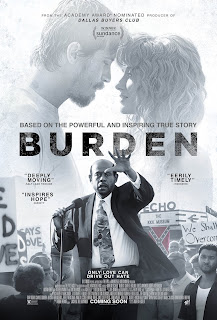... the go-to site for African-Americans to receive reviews of African-American television and film from other African-Americans. More importantly, BMRC is a vehicle for African-American adult consumers to both voice their honest opinion about portrayals of African-Americans in television and film and have access to the authentic thoughts and criticism of the portrayals of African-Americans from other African-American adult consumers.
Friday, March 6, 2020
Burden Review
I'm going to keep this short, because it was a burden to get through Burden. I am tired! Not just because the movie felt extremely long; though the 2 hour and 9-minute runtime was too long for the story, and it actually felt like 3 hours.
I'm tired from the failed attempt to make this a redemption story by trying to humanize the Ku Klux Klan. I'm tired from the attempt to imply that all they need is love and forgiveness from Black people (how many generations and decades does that take, because I feel like that has been attempted over multiple generations and decades). I'm tired from the scene where Forest Whitaker's character, Reverend Kennedy, lists out all the reasons he feels bad for Klansmen like Mike (Garrett Hedlund). As if being poor, uneducated, and brainwashed excuses hate and violence perpetrated by Mike and those like him. A lot of people struggle financially, have been unable to go to college or even finish high school, and have had family members attempt to guide them in the wrong direction, and have somehow managed not to join a hate group. Mike's girlfriend, Judy (Andrea Riseborough) being a prime example. So the film failed twice at trying to get me to empathize with Mike. Sorry not sorry.
It truly felt like the film was not for me or people who look like me. The film's inappropriate and/or unintentional inclusion of comedic relief centered on what was to me Black trauma. So it was both uncomfortable and hurtful when the audience laughed. One example, the laughter that came when Mike came to dinner and a young Black man looked shocked. This was not a funny moment for me, because this was the face of the young man who knew this man horrifically beat his close friend. Or when the fake woke audience knew not to laugh at the racist Black joke in the restaurant scene but laughed when the Klansman made the joke about the INDIAN owner having dog meat in his food and the owner saying he's mixing him up with Chinese people. That joke was just as racist as the joke he made about Black people in the same scene. Additionally, seeing violence towards Black bodies didn't seem to emotionally move the audience, but when the Black hotel owner pointed out to the reverend he was with a Klansman and refused to let him stay in his hotel you could hear the audible White tears as the audience literally collectively let out an "awwwww." Where was that when he was beating the young Black man? It took a Black person about to be set on fire to get an audible emotion from the audience due to violence against Black bodies. There was a scene where there was more emotion at the Black guy making a comment about Judy than when Mike responded by calling him the N-word and punching him (mind you this was after he left the Ku Klux Klan).
Given the subject matter, I assume there was supposed to be a takeaway from the film; some value-add. I left with nothing. I don't see why this story needed to be told. It's an old and tired trope. Who needed to hear this tale?
The most interesting thing I took from the film was as an 80's baby the 90's seem so recent until you do the math and realize 1996 was 24 years ago. But I didn't need this long, uncomfortable movie to make me think about that.
